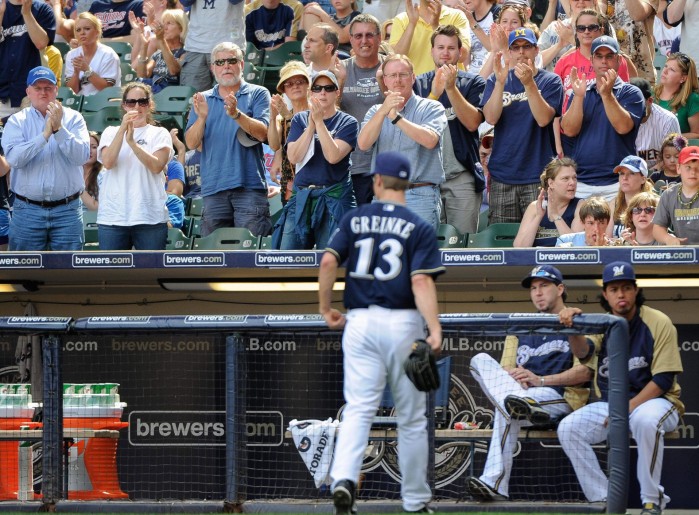Zack Greinke signed a six-year, $206 million contract with the Arizona Diamondbacks last week and put to rest my irrational sports dream that he would return to Milwaukee for a triumphant vengeance tour. I suppose that will have to wait for 2021, when 38-year-old Greinke will undoubtedly team up with suspiciously spry and athletic 37-year-old Ryan Braun to carry the Brewers to a World Series. But until then…
The Diamondbacks may have been one of the few teams less likely than the Brewers to rise up and spend the money necessary to acquire Greinke’s services. The move has thrown the balance of power in the NL West entirely out of whack. Neither the Dodgers nor the Giants could have been considered a great team in 2015, while Arizona surprised many by hanging around .500 through the entire season. Greinke’s move to Arizona could make the Diamondbacks a contender, particularly if they aren’t done adding talent to this squad.
But to me, the most intriguing story to emerge from Greinke’s new deal comes from this Jayson Stark tweet:
Hearing lots of consternation from other clubs about the Greinke deal. Sources say the Dbacks got almost $80M in revenue sharing last 3 yrs
— Jayson Stark (@jaysonst) December 5, 2015
Consternation? What could the other owners be mad about, other than the fact that they just got outspent on one of the finest pitchers in the world? As Stark elaborated, the crux of the issue is that the Diamondbacks beat out richer teams using money from the revenue sharing pool — that is, they effectively stole Zack Greinke from the Dodgers with the Dodgers’ own money. While that may indeed be consternating, this is also exactly the purpose of a revenue sharing program. How do you bring a star player to a stagnant franchise in an unattractive city? You pay him.
The suggestion that the Diamondbacks somehow stepped out of line by paying for Greinke is absurd for a few reasons. It’s absurd because Major League Baseball already tries to artificially lower free-agent market value through anti-competitive measures like draft pick compensation (just ask Kyle Lohse) for years. Major League owners even went so far as to collude against the players, which eventually resulted in a $280 million settlement with the players in 1990. Collusion allegations have popped up occasionally since then, most notably regarding Barry Bonds’s forced retirement in 2008. Less well known is that MLB owners also paid out $12 million from the luxury tax funds in the CBA in response to allegations of collusion in 2002 and 2003, although the agreement was made with no admission of guilt.
It’s also ridiculous because this deal almost certainly had less to do with revenue sharing than it had to do with the Diamondbacks’ gigantic new television deal with Fox Sports Arizona, worth $1.5 billion over the next 20 years. After the Greinke move, we already know Diamondbacks CEO Derrick Hall was lying when he told reporters, “No, we really can’t” become big spenders behind the new television contract, which included a signing bonus. Television money has been a huge determinant in who can spend and who can’t in the Major Leagues, and as I wrote for Sports On Earth back in 2014, the richest of the rich teams are taking action to ensure the millions they rake in through television stay in their own coffers. Multiple large-market teams have taken huge equity stakes in their regional sports networks, most notably the Red Sox (80 percent), Dodgers (50 percent), Phillies (25 percent) and Yankees (20 percent) because that money, conveniently enough, isn’t subject to revenue sharing.
This is the kind of rule that should infuriate Brewers fans, because the Milwaukee market will always be at a huge disadvantage with respect to the power of TV money purely based on population counts. Milwaukee remains the smallest television market in the league. Television has swiftly become the primary source of revenue for baseball teams, and for these teams to hide that money from revenue sharing through ownership stakes in a television channel that primarily exists to broadcast and profit from baseball games blatantly flies in the face of the spirit of any revenue sharing program.
In the eyes of baseball’s owners and executives the problem here is the Diamondbacks, who dared to spend some of the television windfall that is falling into owners’ laps across the league, who dared to improve the product on the field rather than pocket the extra profit. And that tells you everything you need to know about how little they care about the fans, the players, or any of the people who actually give life to baseball in America.

1 comment on “Zack Greinke’s Contract Consternates The Owners”